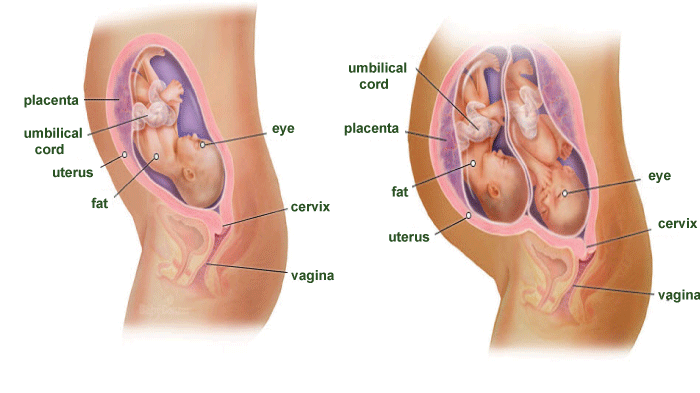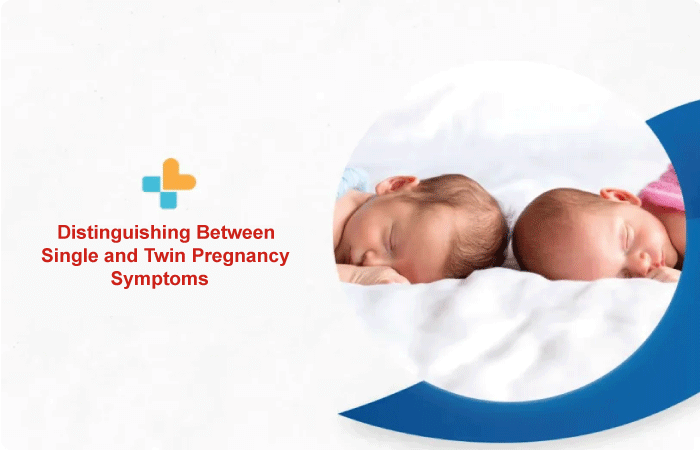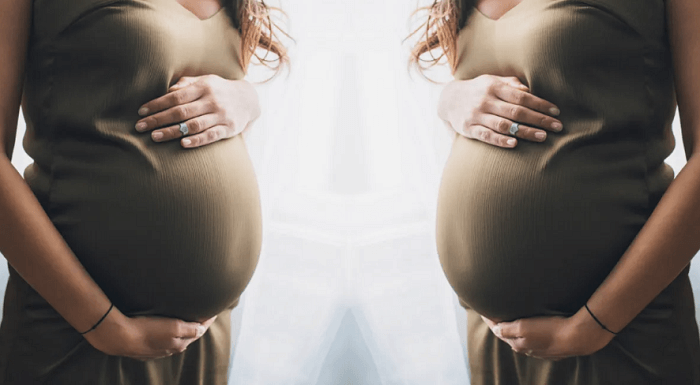Difference Between Single and Twin Pregnancy SymptomsIntroduction: Single Pregnancy and Twin PregnancySingle PregnancyOne fertilized egg implants in the uterus and develops into a fetus, resulting in a solitary pregnancy. Single pregnancies account for the overwhelming majority of pregnancies. The woman will carry one baby to term. 
Twin PregnancyA twin pregnancy results when two fertilized embryos implant in the uterus and grow into foetuses. Fraternal or identical (monozygotic) twin births (dizygotic) are possible. While fraternal twins are created when two different eggs are fertilized by two different sperm, identical twins are created when a single fertilized egg splits into two embryos. Twin pregnancies can raise the chance of some complications and necessitate more intensive monitoring by medical professionals. Usually, twin pregnancies end in the birth of two children. Variations in Early Pregnancy SignsThere are some variations in the signs of early pregnancy between singleton and twin pregnancies Single PregnancyEarly prenatal signs of a single pregnancy typically resemble those of a twin pregnancy. Missed periods, exhaustion, nausea, vomiting, breast tenderness, and frequent urination are typical early signs. As the pregnancy progresses, the mother may develop additional signs, such as food cravings and mood swings. In a single pregnancy, the mother might not become aware of any significant changes in signs until much later. Twin PregnancyDue to the increased hormone levels and quick changes in the body during a twin pregnancy, some women may experience more severe symptoms sooner than during a single pregnancy. Early signs of a twin pregnancy can include breast tenderness, more severe morning sickness, and exhaustion. The mother might also observe that her abdomen is expanding more quickly than anticipated, and she might experience increased pressure in her bladder due to the uterus's expanded size. Some of the mother's symptoms, like spotting, cramping, or an elevated heart rate, may necessitate medical care. Variations in Pregnancy-Related Physical AlterationsThe following are some variations in physical alterations between single-twin pregnancies Single PregnancyThe uterus will expand during a single pregnancy to make room for the developing foetus. The woman might gain weight, see changes in her skin color, and develop a dark line down the middle of her abdomen. (Linea nigra). The woman might also undergo breast changes, such as enlargement, tenderness, and areola darkening. Due to the added weight and strain on her organs, the mother may grow more uncomfortable as the pregnancy continues. Twin PregnancyThe uterus will expand during a twin pregnancy to make room for two foetuses. The mother might acquire weight more quickly and develop a bigger belly than during a single pregnancy. Due to the mother's growing uterus and the strain it puts on her organs, she might also suffer from more intense back pain, leg cramps, and breathing problems. Pregnant women occasionally experience elevated blood pressure or gestational diabetes, which may necessitate medical attention. Due to the increased pressure on her blood vessels, the mother may be more susceptible to varicose veins and hemorrhoids. Variations in Foetal Activity and MobilityThere are some variations in foetal activity and mobility between twin and single pregnancies Single PregnancyBetween 16 and 25 weeks into a single pregnancy, the mother may sense foetal movements (quickening). The motions may begin as slight flutters and become stronger kicks and rolls. The mother will probably feel the infant move more frequently and strongly as the pregnancy continues. The mother's actions and position may impact the baby's activity level, which may change throughout the day. 
Pregnancy with twins. Due to the presence of two foetuses, the mother of twins may experience foetal movements sooner and more frequently than in a single pregnancy. The movements could be rolling or twisting and feel more intense. Additionally, the mother might experience simultaneous motions from both infants. As the pregnancy progresses, the mother may become aware that the babies have distinct sleep patterns and may be more active at various times of the day. The baby's movements may also increase the likelihood that the mother will feel pain or discomfort, particularly as the babies get bigger. Variations in Appetite and Weight IncreaseSome variations in appetite and weight increase between singleton and twin pregnancies. Single PregnancyDepending on her pre-pregnancy weight, the mother may be recommended to gain between 25 and 35 pounds during a single pregnancy. Throughout the pregnancy, the mother's appetite may change and may be affected by conditions like morning sickness, food aversions, and cravings. The mother may be advised to consume a healthy, balanced diet to ensure the foetus gets enough nutrition. Twin PregnancyDepending on her pre-pregnancy weight, the mother of twins may be recommended to gain between 35 and 45 pounds. Due to the higher metabolic demands of carrying two foetuses, the mother may feel more strong cravings and hunger. To support the foetus's growth and development, the mother may need to eat more regularly and consume more calories than during a single pregnancy. However, the mother could also suffer from more intense nausea and vomiting, making it challenging to consume and might prevent her from gaining enough weight. The mother may need to work closely with her healthcare provider to monitor her weight growth and ensure she provides both foetuses with the nutrition they require. 
Variations in Dangers and ComplicationsHere are some variations in dangers and complications between single-twin pregnancies Single PregnancyGestational diabetes, preeclampsia, and preterm labor are complications that a mother may encounter during a single pregnancy. The mother's age, weight, and medical background are a few variables that may affect the likelihood of these complications. If the mother already has a medical condition or acquires one during pregnancy, the risk of complications may rise. Twin PregnancyPreterm labor, intrauterine growth limitation, gestational diabetes, and preeclampsia may all be more likely to occur in a twin pregnancy. The type of twins (identical or fraternal), the number of placentas and amniotic sacs, and the mother's medical history can all affect the risk of these complications. If the babies are in the breech position or have other complications, the mother may also be at an increased risk of requiring a caesarean delivery. Infants may be more likely to deliver prematurely, which increases their risk of developing several health issues, such as respiratory distress syndrome, jaundice, and nutrition issues. To track the growth and development of both foetuses and spot any potential problems, the mother may require more frequent prenatal check-ups and ultrasounds. Variations in Labor and BirthThere are some variations between single-pregnancy labor and delivery and twin-pregnancy labor and delivery: Single PregnancyIf there are worries about the mother's or foetus's health during a single pregnancy, the mother may go into labor naturally or require an inducement. Depending on the baby's position, the mother's medical history, and the stage of labor, the mother may birth the baby vaginally or via caesarean section. The mother's age, weight, and medical history are a few variables that may impact the duration of labor and delivery. Twin PregnancyIf the babies are in a breech position or have any other problems, the mother of the twins may be more likely to require a caesarean delivery. Additionally, the mother may be more likely to experience preterm labor, which could necessitate medical assistance to either postpone or stop delivery. The position of the babies, the number of placentas and amniotic sacs, and the mother's medical history are just a few examples of the many variables that can affect them. The Duration of Labor and DeliveryIf there are any worries about the baby's health or if the mother develops a condition that necessitates an immediate delivery, the baby may occasionally need to be delivered early. To ensure that both babies are handling the process well and to spot any potential complications, the mother may need to be carefully watched during labor and delivery. Managing Numerous PregnanciesThe mother may experience physical and emotional stress due to numerous pregnancies. The following advice can help you deal with numerous pregnancies:
Sleep is essential throughout pregnancy but crucial when carrying multiples. When feasible, try to get a full night's sleep and naps during the day.
Eating a healthy diet is crucial for both the mother and the foetus. You should discuss the kinds of foods you should consume and the recommended serving sizes with your healthcare provider.
Water consumption is crucial throughout pregnancy but becomes even more crucial when bearing multiples. To remain hydrated throughout the day, make sure you are drinking enough water.
A strong support network is crucial during pregnancy but becomes even more crucial when bearing multiples. Consider sharing how you feel with your partner, family, and friends and attending a support group for mothers of multiples.
Being physically and emotionally healthy during pregnancy can be facilitated by staying active. The exercises you can do while pregnant should be discussed with your healthcare provider.
Making preparations in advance can ease the adjustment to life with multiple and help you feel less stressed. Create a birth plan, place a support system for when the babies are delivered, and prepare your house for the new arrivals.
Taking care of your mental health is essential because pregnancy can be emotionally taxing. If you have signs of depression or anxiety, consult your healthcare practitioner. They can offer you tools and assistance. Questions and Answers about Twin PregnancyThe following concerns are commonly asked about twin pregnancies:
Identical and fraternal twin pregnancies are the two kinds of twin pregnancies. Fraternal twins are created from two distinct fertilized eggs, whereas identical twins are created from one fertilized egg that divides into two embryos.
Usually, twin pregnancies receive closer monitoring than singleton births. This could involve more frequent prenatal check-ups, ultrasounds, and other exams to track both foetuses growth and development and spot potential problems.
Preterm labor, preeclampsia, gestational diabetes, and intrauterine growth restriction are some frequent side effects of twin births. (IUGR). The infants may occasionally be premature and require care in the neonatal critical care unit. (NICU).
Several variables, such as age, fertility therapies, and other medical conditions, influence the likelihood of becoming pregnant with twins. Having twins is generally 3% likely, but unique circumstances can change this.
Common misconceptions about twin pregnancies include that all twins are identical, having twins necessitates a caesarean section, and all twins are delivered too soon. These aren't always accurate, so you should discuss them with your doctor.
When having twins, special considerations may be necessary, such as a higher risk of caesarean birth, the requirement for extra medical personnel, and a longer recovery period. Talking with your healthcare provider about your choices and preferences is crucial to making a birth plan.
If you are expecting twins and encounter any of the following signs or symptoms, you should see a doctor right away:
Next TopicDifference between
|
 For Videos Join Our Youtube Channel: Join Now
For Videos Join Our Youtube Channel: Join Now
Feedback
- Send your Feedback to [email protected]
Help Others, Please Share










